I have been warning on China for at least a few years. Today, China’s “Grow At Any Cost” policy is starting to unravel. Earlier today Chinese stocks took a 2-3% hit, CSI 300 Index hit a five year low, the Yuan fell 0.2% and overseas shipments plunged 18.1% (vs +7.5% estimate).
Cracks in the foundation or beginning of a collapse?
Both. Listen, China is unlikely to collapse or unravel within a short period of time. Whatever happens will take a considerable amount of time due to massive Government interference. To see how long, we must once again look towards the US Stock Market & Economy. The bear market and recession of 2014-2017 will take 3 years to complete. During that time Chinese exports are bound to slow down even more. In addition, with anticipated credit market blow ups it is unlikely China will be able to continue to expand it’s credit at break neck speeds of the last few years. Indicating a further slowdown and a subsequent collapse.
Did you enjoy this article? If so, please share our blog with your friends as we try to get traction. Gratitude!!!
Click here to subscribe to my mailing list
Is China Beginning To Collapse? Google
Bloomber Reports: China’s CSI 300 Plunges to Five-Year Low on Export Slump :
China’s CSI 300 Index (SHSZ300)plunged to the lowest level in five years and the yuan weakened as an unexpected drop in exports spurred concern that the world’s second-largest economy is slowing.
The index of the largest Chinese stocks slid 3.3 percent to 2,097.79 at the close, the lowest since February 2009, while the Shanghai Composite Index tumbled 2.9 percent, the most since June. The yuan fell 0.2 percent to 6.1385 per dollar. Money-market rates slumped to a 21-month low amid speculation demand for cash is diminishing as economic growth weakens.
Overseas shipments plunged 18.1 percent in February, compared with analysts’ median estimate for a 7.5 percent increase, as distortions from the Lunar New Year holiday made forecasting more difficult. Investors are looking for policy guidance from this month’s National People’s Congress in Beijing amid concerns over slowing growth, a flood of new share sales and geopolitical tension between Russia and Ukraine.
“There’s a slew of bad news today — lousy economic data, IPOs may be restarting, the policy meeting is ending soon with no surprises and the Ukraine situation isn’t helping,” said Xu Shengjun, an analyst at Jianghai Securities Co. in Shanghai. “The market is being dragged down by all these factors, I don’t see any positive stories today.”
Growth Target
Jiangxi Copper Co. led declines for material producers, slumping 5.8 percent as copper prices on the Shanghai exchange plunged by the 5 percent daily limit. China is the biggest consumer of commodities from copper to iron ore and rubber.
Poly Real Estate Group Co. tumbled 4.8 percent after the developer reported a 8.4 percent drop in sales for last month. A weaker yuan is boosting dollar borrowing costs for Chinese developers already grappling with a domestic property-market crackdown and slowing sales.
The drop in exports highlights the challenges for Premier Li Keqiang in achieving this year’s economic growth target of 7.5 percent. Li announced the goal last week at the opening of the annual meeting of the NPC, a pace unchanged from last year. Imports rose 10.1 percent from a year earlier, leaving a trade deficit of $23 billion, the biggest in two years.
China’s consumer price index rose 2 percent in February from a year earlier, the smallest gain in 13 months, data from the National Bureau of Statistics showed yesterday. Producer prices (CHEFTYOY) fell 2 percent, the most since July.
Cheapest Valuation
“The inflation and PPI numbers signal a lack of demand from consumers and industries, while the export number is way below expectations even after discounting the Chinese New Year effect, so investors are concerned,” said Du Liang, an analyst at Shanxi Securities Co. in Beijing. “I reckon the sell-off will get some support at the 2,000 level” on the Shanghai Composite index, which closed at 1,999.07 today.
The CSI 300 trades at 7.7 times projected 12-month earnings, the lowest level since at least 2007, according to data compiled by Bloomberg. Today’s tumble is the biggest since a cash crunch in China’s interbank market dragged down the index by 6.3 percent on June 24. The gauge slipped another 0.5 percent in the following three days, then rallied as much as 16 percent through mid-September.
The Hang Seng China Enterprises Index (HSCEI) fell 1.8 percent, dragged down by a 4 percent loss for Anhui Conch Cement Co. The Bloomberg China-US Equity Index slid 1.3 percent on March 7.
The yuan has weakened about 1.4 percent in 2014. The People’s Bank of China lowered the dailyreference rate by 0.18 percent, the most since July 2012, to 6.1312 per dollar today.
The cut in the yuan fixing “is significant, coming on the heels of poor trade data, and suggests a possible policy push to weaken the yuan to help exporters,” said Dariusz Kowalczyk, a Hong Kong-based strategist at Credit Agricole CIB. “This would mean rising risks to more downside.”
Repo Rate
The seven-day repurchase rate, a gauge of funding availability in the banking system, fell 12 basis points to 2.30 percent, according to a fixing published by the National Interbank Funding Center. A one-year rate swap that exchanges fixed payments for the floating seven-day repo dropped as much as 15 basis points to a four-month low of 4.26 percent, data compiled by Bloomberg show.
Slowing inflation may give leaders more space to support growth if needed as they gauge the effects of the nation’s first onshore corporate-bond default.
Shanghai Chaori Solar Energy Science & Technology Co., a solar-cell maker, said March 7 it wasn’t able to make an interest payment due that day in full, providing the first default in China’s onshore bond market. Chaori’s experience may be a sign the government is backing off from its practice of bailing out companies with bad debt.
More Defaults
China should allow companies to default on their bonds, an external supervisor at the Bank of China said March 8.
“We need to be more accepting and allow such defaults to happen,” Mei Xingbao told reporters during a meeting of the Chinese People’s Consultative Conference in Beijing. “The debtor must be responsible for his own debt. He must tell the investors that there is risk involved in the product.”
China Southern Airlines Co. slid more than 3 percent in Shanghai and Hong Kong trading after the carrier said it sold seven tickets for the Malaysian Airline System Bhd. flight that has gone missing.
Malaysia stepped up efforts to locate the jet that may have crashed in the Gulf of Thailand with 239 people on board, focusing on oil slicks. The prospect of terrorism arose after Austria andItaly said passports used by two male passengers were stolen from their citizens. The flight was a codeshare with China Southern.
BlackRock Hire
BlackRock Inc. named Helen Zhu as head of China equities, luring the strategist away from Goldman Sachs Group Inc. to increase coverage of this year’s worst-performing stock market.
Zhu covered Chinese companies traded in Hong Kong and yuan-denominated stocks in the mainland as Goldman Sachs’s chief China equity strategist. She forecast in December that the Hang Seng China index would climb about 20 percent by the end of this year. It has since tumbled 16 percent and is the biggest loser among global benchmark equity indexes tracked by Bloomberg.
“China has been a difficult market to trade and difficult for all strategists to get right,” Hao Hong, the chief China equity strategist at Bocom International Holdings Co., said by phone from Beijing. “That said, Zhu is a good hire as she has done this for a long time. It shows BlackRock’s commitment to the Chinese region.”












